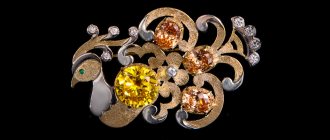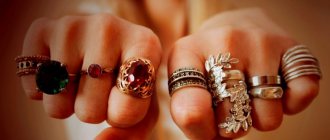Become a courier for the Yandex.Food service right now (up to 3,200 rubles per shift) →
Bank deposit rating
Many people are interested in how much a jeweler earns in Russia, and whether this profession should be considered as one that can bring a good income necessary for a decent life.
Earn money from home, many vacancies, click here!
In order to be able to work in this field, you must have a lot of knowledge and skills, in particular, have an artistic education, and be at the same time a carver, a designer, and an artist. There are special courses on jewelry making, and there are entire disciplines at universities.
Who is a jeweler
The profession is very ancient. Even before our era, man sought to decorate himself and stand out from other people. Already in ancient times, jewelry was aimed at demonstrating the social status of the owner. Belonging to a particular nation was also determined by the decorations. Not everyone knew how to handle precious metals and stones, so these rare specialists were called jewelers. The profession has always been prestigious and in demand.
How much should a woman earn: what do psychologists think about this?
How to get a job as an instructor at a driving school and how much you can earn in the regions
Steve Jobs' written instructions sold at auction for 58 million rubles
Distribution of vacancies by salary
Let's consider the distribution of vacancies (with the specified salary) by salary range for 'jeweler' (Russia).
Up to RUB 41,000.0: 13.38% of vacancies.
From 41000.0 rub. up to RUB 53,000.0: 14.65% of vacancies.
From 53000.0 rub. up to RUB 69,000.0: 17.2% of vacancies.
From 69000.0 rub. up to RUB 81,000.0: 23.57% of vacancies.
From 81000.0 rub. up to RUB 101,000.0: 21.02% of vacancies.
From RUB 101,000.0: 10.19% of vacancies.
The distribution of vacancies by salary can also give a rough estimate of the minimum and maximum salaries for a 'jeweler' (Russia).
Inside the profession
But you can’t just go and become a jeweler based on your own desire. To become successful you need to have talent, work hard and be very patient because the job involves fine motor skills. The profession itself is divided into several types. A distinction is made between a mounter, an engraver, a fashion designer and a jewelry designer.
The assembler is engaged in assembling simple decorations. The engraver puts various inscriptions and complex designs on them. In the hands of a fashion designer is the opportunity to create an original piece of jewelry. But the designer is exclusively engaged in developing the appearance of the future decoration.
A jeweler has a lot of tasks, so his competence includes several complex sciences: mathematics, chemistry and gemology.
Salary statistics for some professions and specializations
The largest share of vacancies falls on the following professions and specialties: jeweler-mounter, jeweler-setter, jeweler-polisher, jeweler-universal.
Overview of salaries for some professions and specializations
| Technology | Average salary, rub. | Median salary, rub. | Vacancies with salary | Total vacancies |
| jeweler-mounter | 72951.0 | 71000.0 | 41 | 56 |
| jeweler-setter | 84636.0 | 79000.0 | 22 | 34 |
| jeweler polisher | 64667.0 | 59000.0 | 12 | 15 |
| universal jeweler | 86667.0 | 81000.0 | 12 | 13 |
Where to work
A jeweler has a large field for activity. You can work not only in private workshops, including your own. Those who want to be part of the corporate culture can work in state-owned enterprises and factories. Jewelers are also always welcome in specialized stores. A good jeweler who masters his profession can cope with any level of tasks and create jewelry according to his own or designer’s sketches. If you want to be a free bird and have your own brand and its fans, it makes sense to think about opening your own workshop.
Profession: jeweler. Advantages and disadvantages. Responsibilities and salaries of jewelers in Russia
20 September 2021, 19:03
A career like a jeweler allows you to combine your creative talent and business skills with the ability to create and create something with your own hands. Jewelers design and, quite often, create jewelry using completely different materials, including gold, silver and precious stones.
You can create designs and models of future products for mass production, produce products in small quantities, or make several pieces to order for a client.
And if you work in a company, then other employees of the company can make products based on your ideas and sketches.
Responsibilities of a jeweler:
As an applicant for the position of jewelry designer, you will need:
- be able to advise clients on all issues
- discuss with the client various options for creating products and be able to form and develop original ideas
- be able to sketch an idea and draw a sketch, sometimes using computer-aided design (CAD), to help the client visualize the finished product.
If you create and make products yourself, then the following also applies to your activities:
- Mounting of products (mounting) - production of frames for jewelry. This involves cutting, shaping and drilling the metal, as well as creating seats into which selected stones are mounted.
- Making a model (casting) is the production of the product itself or decorative fragments using processes such as casting, stamping, embossing and imprinting.
- Embossing – making a relief pattern on the surface of a metal
- Soldering and product manufacturing
- Polishing – providing the final part of the jewelry making process
You can also carry out the following specialized processes, but more often the jewelry is sent to small businesses (home-based businesses) where these processes are carried out.
- Setting stones - working with a frame, with seats for stones, in order to perfectly fit and secure the stones. Making such adjustments can involve very complex work, such as, for example, removing tiny fractions from the metal (meaning trimming, for example, under a stone to add volume and shine)
- Electro-plating (cladding) - layer-by-layer application of precious metal, coating on the base metal of the product
- Enameling - fusing powdered glass with metal in a kiln to create colored patterns and designs
- Welding - joining metal fragments using traditional methods or laser methods
- Engraving is the carving of inscriptions or patterns on precious metals, either manually or using computer-aided manufacturing (CAM).
Promoting and growing your business is critical to achieving success as a self-employed jewelry designer. Many jewelers try to increase their reputation by networking, entering competitions and attending craft fairs.
Other activities include consulting at jewelry shows, stores, and buyers and suppliers, as well as monitoring the jewelry market and fashion trends.
Jeweler salary
- Starting salaries for self-employed jewelery designers can vary from country to country, with the UK costing around £16,000 per month as an example.
- Salaries for experienced jewelers in Britain can range from £20,000 to £50,000 per month.
- In Russia, the average salary of a jeweler is about 30 - 40 thousand rubles per month.
But also the positions presented above are often limited in number for those wishing to work in such positions. Most jewelers build their careers as freelancers or start their own businesses. You may accept a lower-paying position in order to learn and acquire specific skills from experienced craftsmen.
Salaries vary depending on whether you are employed or self-employed, experienced, successful and well-established, and how actively and skillfully you market your jewelry or business. It is possible to start making good money early in your career, but it can be very difficult and you may need additional income.
Income figures are provided as an example only.
Schedule
Most jewelers work as employees or freelancers, which leads to greater flexibility and the ability to work as many hours as necessary to feel comfortable, or can be combined with other work.
If you're a solopreneur, you may find that your schedule will fluctuate to suit your needs and those of your clients. For jewelers working at the enterprise, working hours are usually regulated and do not imply changes.
Outlook or what to expect
- The workplace can range from a small studio to a large workshop that can be noisy and dusty. An independent, self-employed jeweler can share a workshop with other fellow jewelers.
- If you are a freelancer or self-employed jeweler, you can work from anywhere. Most working jewelers are located in cities.
- Self-employed jewelers often work on commission or sell their services through craft fairs and retail outlets.
- Traveling to exhibitions and trade fairs is an irregular part of the job.
- In the short term, designers sometimes take on temporary work until they gain the appropriate skills and experience. And this can be a good help. To achieve your goals and long-term prospects, a necessary compromise is to take into account your working time and the ability to adequately manage it.
Qualification
You don't need a degree or college diploma to be a jeweler—proven working skills in your creative craft are more important—but a degree or good experience in the field is generally necessary to acquire and improve your skills.
The most relevant specializations necessary for comfortable work and employment:
- jewelry design and production
- silversmith
- 3D design.
Any art and design degree, art diploma, skill and experience in craftsmanship can give you an advantage in a variety of areas, including:
- in applied arts
- fashion design
- visual arts
- textile design
All this also makes it possible to create and perform these types of work, with other art and design degrees, as well as when you have a suitable portfolio and a willingness to learn and improve your skills. A postgraduate qualification is not necessary, although it may be useful for transferring from other areas of art and design.
Look for postgraduate courses in jewelery design.
Skills
You will need to show:
- creative thinking and vision, developing new ideas
- practical application of manufactured products and goods that are in demand on the market
- practical ability to work with tools and materials such as metals and precious stones
- ability to draw and skills in computer design and product design
- dexterity, attention to detail and good hand-eye coordination
- organization and time management skills and ability to work under tight deadlines
- commercial awareness, self-confidence and temperament, in order to be successful in the business world
- the ability to sell yourself and your work
- Negotiation and persuasion skills when working with suppliers and buyers
- commitment and passion for work
experience
Work experience is valuable and helps you develop connections in your industry, and experience in the jewelry industry is also valuable. You can find an internship in your specialty, or you could try to contact jewelers to get an internship in a workshop with a real master jeweler.
Employers
It is important to be flexible and proactive in your approach to job searching in order to find one. Some graduates are offered jobs below their degree and qualifications, but for many it is important to take advantage of any opportunities that arise to gain employment in their industry.
A portfolio, website, or photo of your work on a CD is important proof that you have the necessary design skills and the ability to generate new ideas.
Most jewelry designers are either self-employed—setting up their own workshop studio—or freelance—working with individual craftsmen or fashion and jewelry designers.
You can build your own business - thereby telling a story about yourself and your work. You can sell your designs to manufacturing companies, factories, or create your own designs and products, making your own line of products for sale through craft workshops, galleries and online stores.
Jewelry vacancies are rarely advertised and very often you come across unscrupulous and deceptive vacancies. Knowing where to look for jobs, how to market yourself, and being prepared to work and take advantage of your opportunities are all critical.
It is quite possible to get a job in large jewelry companies. Typical employers are divided into: factories and jewelry workshops. Companies are often small and medium-sized enterprises (SMEs) with up to 20 employees.
You can search for vacancies on our website: https://finagel.ru/job/
P. _ S. _ — Recruitment agencies rarely advertise such vacancies.
Professional growth and development.
Jewelry crafting is a lifelong journey, constant learning and learning is required throughout your career - this will help you develop your skills and keep up with the times and be the first to respond to changes in the jewelry industry.
Constant learning and development provides the opportunity to experiment, diversify or improve your skills, making products of higher quality within the framework of specialization. Courses offered at postgraduate level provide the opportunity to work and build your career, such as:
- goldsmith
- master all-rounder
- working with different metals
- silversmith
In general, skill development courses offered by colleges or businesses are also beneficial and can be a quick and significant help in mastering jewelry techniques and increasing your experience in the industry.
Specialized courses are available in areas such as setting, engraving, enameling and stone carving.
If you work for a company, they can pay and provide your training. It is usually taught under the guidance of a more experienced master.
Business skills are important if you are thinking about going into business on your own. The annual, free, week-long business course “Starting a Jewelry Career” for recent graduates of courses in working with precious metals and jewelry production is conducted by the Jewelry Center from the company’s famous jewelers.
Career prospects
As you know, your job depends on your career growth and the success of your business. You can showcase your work to employers and potential clients along with other jewelry designers on a range of specialized websites.
Joining a professional organization can help with your professional development and career advancement, and is also a good way to meet and make friends with established jewelers.
Some leading organizations are:
- Typical jeweler
- Armouries
- Union of Artists
- Restorers
Participating in fairs and exhibitions can be an important step and action to develop your career. Getting recognized as a jewelry maker can be a long process, but the rewards can be great if you are willing to grow your business, continue to learn, and stay on top of what trends are trending in order to produce sought-after and original jewelry.
In such events, new opportunities may arise for jewelers to move into other areas such as design or retail sales or buying of products and beyond. It is also possible to obtain the opportunity to work in studios, art galleries, to further continue their studies, the opportunity to teach and learn on their own. Opportunities in the jewelry industry will open up for you if you are ready to learn, to learn, to master new skills and abilities.
Based on source materials: https://www.prospects.ac.uk
Authors of the translation: Alexey Tuev and Dmitry Tataurov
All news
Pros of the profession
Like any other profession, there are pros and cons.
First of all, this is the high demand for the profession in the labor market. The profession can also be acquired by those who, for whatever reason, have limited mobility. The work requires only hands and a keen eye. People with limited ability to work can express themselves fully in this profession and not feel disadvantaged in society.
Who do you follow on social networks: what interviews should be said as honestly as possible
A woman knits items to order not only from dog hair, but also from wolves.
Residents of the Russian Federation value their jobs, but two-thirds are looking for a new one while staying at their current job
Jeweler is a very promising profession. As a rule, after graduating from college or institute, inexperienced jewelers begin their practice at large state-owned factories or in jewelry manufacturing companies. In a large team, junior employees are usually entrusted with working on simple orders in order to hone their skills and put their acquired knowledge into practice. Yesterday's graduates enter production with a zero rank, but gradually, as they gain experience, they are awarded the next rank. There are seven ranks in total, and the seventh is the highest. Specialists with this level can safely apply for the post of director of an enterprise or open their own jewelry production business.
What to do if you are haunted by the fear of dismissal: all possible actions
Nikolai Baskov gave Sofia Rotaru a bracelet with emeralds and diamonds
Unusual experiences that evoke emotions: the secret of customer service
I would also like to note the presence of a narrow specialty. Of course, if you wish. If you don't want to do cutting, you can always dedicate yourself to jewelry repair. The work, of course, is not often creative, but it depends on how you look at it. Repairing unique, intricate jewelry definitely requires creativity.
Professional income
In our country, the main work is done by ordinary factory craftsmen who know how to work with a file, a gas torch and other simple tools.
They invent and make many devices themselves.
level depends on many factors:
- place of residence - the greatest need for specialists is observed in large cities, where they receive more;
- popularity of the company and each individual master;
- variety of services provided.
The average salary of jewelers in Russia is 50,000 rubles. ($743). The minimum level is 30,000 ($449), and the maximum is 70,000 ($1,049). Most employers offer salaries from 48 to 64 thousand ($719 - 959) per month.
In large cities, specialists earn:
- Moscow and St. Petersburg – 40,000 rubles. ($599);
- Sverdlovsky – 37,500 ($562);
- Kostroma – 25,000 ($375).
The chosen specialization has a great influence on the size of a jeweler’s salary:
- artist – 70,000 ($1,049);
- designer – 58333 ($874);
- jewelry designer – 46,667 ($699);
- fixer – 26667 ($399);
- assembler – 23333 ($350).
The salary of a jeweler's apprentice is from 25 to 30 thousand rubles. ($375 – 479). An extra-class master receives from 250,000 ($3,745) or more for the development and creation of a product from a drawing to a full-fledged decoration.
A salesperson in a jewelry store earns:
- in the regions - 30,000 rubles;
- in Moscow – 50,000 ($749).
Experienced traders, with knowledge of trends and nuances of jewelry, also receive a percentage of sales.
Cons of the profession
This profession has medical restrictions. For example, there should be no mental illness or eye problems. It must be borne in mind that vision may decrease over time, because the work requires concentrating on the smallest details.
It is impossible to master the profession on your own, because this requires specialized equipment, and it costs a lot of money.
A person must have certain character traits, such as perseverance, concentration, accuracy, patience and physical endurance, because the work is sedentary and there is no opportunity to move a lot.
There is a possibility of injury because the jeweler works with a lot of chemicals to process the metal and stones. There are especially many dangerous acids in the working environment: hydrochloric, sulfuric, nitric.
The salary of this master depends largely on many aspects, in particular
- In what locality does he work? The larger the city, the higher the income it receives.
- In addition, the formation of earnings is influenced by the number of clients who turn to the master, as well as the popularity of the company and the good reputation of a certain employee. Often people are ready to scour dozens of forums in search of a good master, but word of mouth works best, which allows one satisfied client to receive dozens of offers from his friends in the future
- .It is very important what services they are ready to offer our fellow citizens: resoldering bracelets and chains, resizing rings, making custom jewelry, etc. The larger the list, the more opportunities to attract buyers.
All these factors affect the final amount. It can vary from 30 thousand to 70 thousand and much higher. Read about who else can count on the same amount here.
The high numbers are due to the fact that jewelry craftsmen perform truly complex work that requires very precise actions.
They manufacture and repair products from precious and semi-precious stones, precious metals and their alloys. Such specialists work both in factories and workshops.
Salary by country
And of course, salary. In general, a jeweler’s salary is good, but it must be clarified that the amount depends on the qualifications of the craftsman, the demand for products and work with additional options in the form of repairs. This is what a jeweler's salary is made up of.
Of course, the highest salaries for jewelers are in Moscow. According to experts, it is about 100 thousand rubles. Then comes St. Petersburg and Kostroma, in these cities the salary varies around 67 thousand rubles. The average salary of a jeweler in the country is about 79 thousand rubles. Also, the final amount depends on the direction and qualifications of the specialist.
Found a violation? Report content
List of salaries for jewelers in Russia and some CIS countries
Russia - beginners can count on an income of about 23 thousand rubles, the average salary is about 32 thousand rubles, professionals in this field earn up to 100 thousand rubles.
In Kazakhstan, you can earn approximately 77 thousand tenge as a novice jeweler. The average salary in the country is approximately 148 thousand tenge, and the maximum level of income for qualified craftsmen is 231 thousand tenge.
Belarus offers a beginner's income of 272 BYN. rubles, the average salary here is 787 Belarusian rubles. rubles, and the salaries of craftsmen reach 1,137 Belarusian rubles. rubles
Ukraine - beginners receive about 4,100 hryvnia, the average salary in the country is 9,770 hryvnia, and the salary of professionals is approximately 15,700 hryvnia.
Attention! Within our portal, you can get advice from a professional lawyer completely free of charge. Ask your question in the form below!











